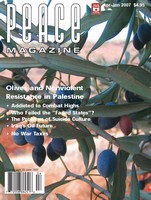
Peace Magazine Apr-Jun 2007, page 15. Some rights reserved.
Search for other articles by Metta Spencer here
Lipset's Gift to Peace Workers: On Getting and Keeping Democracy
Seymour Martin Lipset was a great scholar and a man of peace, known in Canada mostly for his comparative studies of the United States and Canada and his history of the Saskatchewan origins of the NDP. He was my mentor and my friend. Back in the1960s I was his research assistant for five years at Berkeley and Harvard, and we always stayed in touch afterward, though during his last six years it was difficult, for he had been incapacitated by a stroke. He died on New Years Eve.
For years Lipset had sought solutions for the Israeli/Palestinian conflict, He had also served as vice chair of the board of directors of the United States Institute of Peace. However, in the long run I think his greatest contribution to peace will turn out to be his research on democracy. No academic has ever done more to show what factors allow societies to sustain stable democracy. In 1959 he proved empirically what Aristotle had only theorized: Democracy flourishes most in societies with high socio-economic development -- especially widespread education. This finding prompted a host of other research into the preconditions of democracy as well as its consequences.
Democracy has increased globally in three consecutive "waves" -- the first between 1828 to 1926; the second from 1943 to 1964, and the third from 1974 until about 1992. Today some 60 percent of the world's countries are at least formally democratic.
These three advances were never consolidated, however, for after each wave some of the new democracies always regressed. By 1993, when Lipset gave his presidential address to the American Sociological Association, his paper sought to identify empirically the most promising social conditions for keeping democratic countries from reverting to authoritarian or totalitarian control. And although there was still a strong and obvious relationship between economic development and democracy, Lipset could not show which factor was cause and which was effect. That question long remained a topic of debate.
Incontestably, democracy is a peace issue. Full, established democracies virtually never go to war against each other. They do, however, go to war against dictatorships, and of course dictatorships go to war against each other. Logically it follows that if all countries were democracies, there would be no more international wars. And, surprisingly, warfare actually is becoming less frequent as democracy becomes more widespread.
Peace Magazine has published many articles about this connection between democracy and peace, so in 2000, a few months before his fatal stroke, Meir Amor and I interviewed Lipset for the magazine. In explaining the conduciveness of democracy for peace, he said:
"Authoritarian countries can go to war easily because, if the dictator or the one party in control wants to do so, they don't have to worry about opposition. Democratic states have anti-war movements. For example, in every war that America has fought, with the exception of World War II, in which the Japanese attacked, the country has seen a major anti-war movement that continued into the war."
We mentioned his early work on development and democracy, including the question about the direction of causality. I said, "One would have concluded from your research that economic development was a condition for the growth of democracy, but it did not suggest that democracy was a favorable condition for economic development.... Now Amartya Sen has a new book out, Development as Freedom. He argues that democracy -- including civil freedoms, political liberty, and open dialogue -- are prerequisites for sustainable development." Lipset replied,
"Until recently there were many people who believed that democracy undermined economic development in poor countries. The empirical resarch challenges that conclusion, but as to whether democracy actually fosters economic development, I do not think that it had been proved decisively one way or the other. However, Amartya Sen is obviously a first-rate economist, and if that is Sen's considered opinion, I would accept it. He's as good at analyzing such things as anybody I know of."
We talked about the fact that there are never famines in democratic countries, as there have been elsewhere. He said,
"A government in an authoritarian system can ignore distribution problems, as the Russians did in the thirties, when millions died in the Ukraine....Of course, democracy matters."
Lipset's gift to peace workers is an immense corpus of research showing the ways in which "democracy matters." Let's make good use of his discoveries.
Metta Spencer is editor Peace and an Emeritus Professor of Sociology.

Peace Magazine Apr-Jun 2007, page 15. Some rights reserved.
Search for other articles by Metta Spencer here